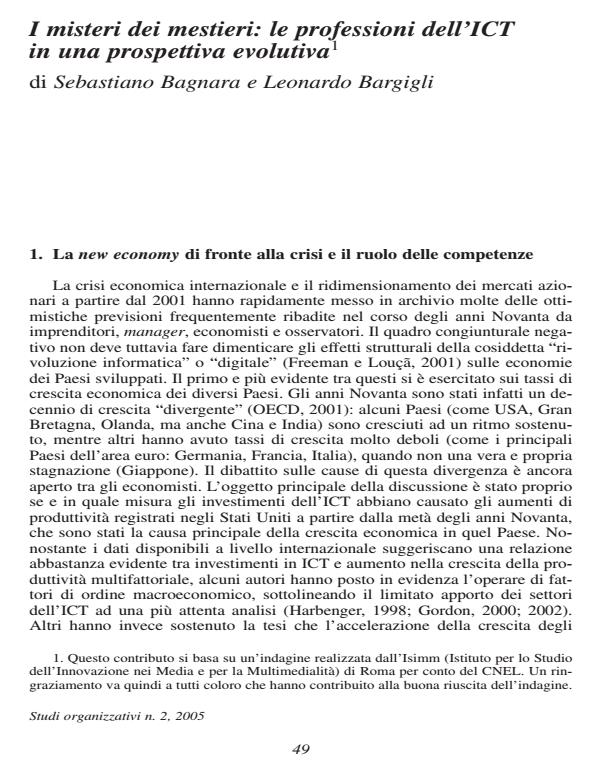I misteri dei mestieri: le professioni dell'ICT in una prospettiva evolutiva
Journal title STUDI ORGANIZZATIVI
Author/s Sebastiano Bagnara, Leonardo Bargigli
Publishing Year 2005 Issue 2005/2
Language Italian Pages 27 P. File size 173 KB
DOI
DOI is like a bar code for intellectual property: to have more infomation
click here
Below, you can see the article first page
If you want to buy this article in PDF format, you can do it, following the instructions to buy download credits

FrancoAngeli is member of Publishers International Linking Association, Inc (PILA), a not-for-profit association which run the CrossRef service enabling links to and from online scholarly content.
The need to map the demand for skills in the ICT sectors has been increasing during the Nineties due to the strong technological discontinuity in these sectors. Nevertheless the prevailing approaches used in this field of analysis are not suitable for the task they are intended to serve. On the basis of very simplified hypotheses these analyses have contributed to support planning decisions regarding training programs which have been focused on the short-term needs of the firms. Consequently in most cases we have trained people for occupational profiles which have completely disappeared in a short period of time. The main goal of this article is to give an example of a different approach which can give sounder policy indications. The main idea is to use a pluralistic approach, i. e. to employ different sources, methods and indicators in order to arrive to a full understanding of a very complex dynamics as that of the micro-changes of occupations. In order to fulfil to this goal the work is organized as follows. In the first place we focus on competences, their relevance and the problems of their measurement and analysis. Then we give a diachronic picture of the demand for ICT occupations in Italy, based on job vacancies announcements published on national newspaper over the period 1994-2002. The demand side is also analysed by reconstructing the demand for occupations of a sample of Italian firms, belonging to different sectors, surveyed in 2003 and analysed through multiple indicators. On the other hand we focus also on the supply side of the labour market in order to reconstruct the occupational and contractual conditions of the individual ICT workers, as well as their previous education and career, social condition and salary. Finally we draw some conclusions, individuating in the training of general skills the main priority of the public educational and training system.
Sebastiano Bagnara, Leonardo Bargigli, I misteri dei mestieri: le professioni dell'ICT in una prospettiva evolutiva in "STUDI ORGANIZZATIVI " 2/2005, pp , DOI: